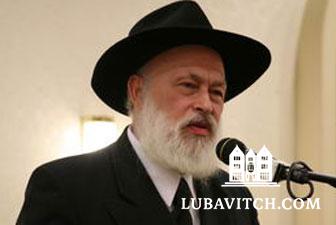Not a topic normally associated with nice Jewish kids, bullies have garnered a lot of attention lately. According to a study published in the Journal of the American Medical Association, nearly a third of children grades 6 to 10 have been bullied or bullied others.
Coupled with the finding that bullying affects children’s mental health, academic performance, and, for the bullies themselves, a future criminal record, it’s one of the hot school issues d’jour.
Last week, 100 educators from Chabad-Lubavitch’s 140 elementary, middle and high schools across North America spent two days in the classroom, devoting more than ten hours of lectures and presentations at the conference to character development, with a focus on positive ways to take on bullies.
The rabbis took notes, leaning forward to listen to the group of experts assembled by Chabad’s educational division, Merkos L’inyonei Chinuch, at Newark’s Robert Treat Conference Center.
Following the approach of Chabad-Lubavitch, the topic was flipped to a positive angle at the conference. Dr. David Pelcovitz, a psychologist, author, and professor, pitched his pointers for helping students develop positive interpersonal communication skills as a stopgap before bullying begins.
Jewish wisdom and the latest educational developments were blended for answers to classroom challenges – character development, classroom management, mainstreaming children with learning disabilities.
Applying Jewish teachings to daily dilemmas struck Rabbi Yosef Charyton, principal of Menachem Mendel Seattle Cheder Day School, as a quality that distinguished the conference from others.
“When you start with Torah as your core, you go back to the source, to a system that is true, real and tested by the ages,” he said. “It gives ideas a tremendous vitality.”
Rabbi Michoel Seligson of Oholei Torah Mesivta High School in Brooklyn, NY, drew on Chasidic teachings that provide practical steps for personal growth among students. On the second day of the conference, Dr. Howard Schapiro of Aleinu Family Resource Center presented an anti-bullying program used successfully in Jewish schools in and around Los Angeles.
Sessions on developing a Talmud curriculum was another example of sculpting general pedagogical material to meet the particular needs of the yeshiva setting.
Curriculum development experts devote much ink to the necessity of setting clear goals to structure effective teaching. Yeshiva University’s Rabbi Dr. A. Hersh Fried did just that when he spelled out the objectives that must be mastered to swim the sea of Talmud.
Rabbi Meir Fachler demonstrated how tools of the modern world, namely software that assists students with essential skills for learning Talmud, may be used in a classroom setting. Tying the package together, Rabbi Yossi Rosenblum discussed how Yeshiva Schools in Pittsburgh, where he is principal, is progressing toward a comprehensive, grade-by-grade Talmud curriculum.
Though the conference was organized for North American schools, educators came from far as London and Brazil. The draw, aside from the courses, was the opportunity to talk shop with peers. For most, it’s a rare opportunity. Chabad schools are in a distinct subset of the education experience. Not only are they teaching children of all levels of affiliation, but also they are often located in cities where they are the only option for a Jewish education.
Judging by the impassioned discussions that kept Chabad educators up late into the night, it’s a responsibility they take very seriously.
Rabbi Nochem Kaplan, director of the Merkos Education Office, said:
“No one hung out around the pool.” Scheduled conference events began at 6:30 a.m. and ended with 11 p.m. sessions.
“The passion for teaching, as a professional calling and not a fall back position, was evident and energizing.”

Be the first to write a comment.